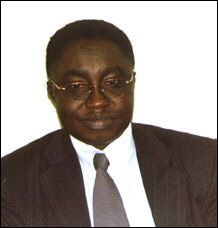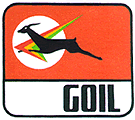
| 

| 
 GHANA OIL COMPANY LTD (GOIL) GHANA OIL COMPANY LTD (GOIL)
Interview with
Mr. Yaw Agyemang- Duah, Acting
Managing Director
October 22nd 1999
Contact :
P.O.Box GP 3183 Accra - GHANA
Tel: (233 21) 228 822
Fax: (233 21) 668 164
|
Could you give us a brief historical background of GOIL?
GOIL is an oil marketing company, which is an off shoot of AGIP Petroleum, which was established in the country as far back as the early 60s together with the Tema Oil Refinery. The refinery did the refining and this part of AGIP did the retail marketing business. In 1974 the government took over the marketing side of AGIP and it became the Ghana Oil Company Limited. Since then GOIL has been operating in the retail market of petroleum products through the stations and the commercial establishments.
Who are the main shareholders of GOIL?
It is 100% government owned.
Are you planning to divest the company in the next couple of years?
There are plans to divest which are largely based on the National Policies and Directives of government of Ghana to get out of commercial enterprises, provide policy frame works and letting the private sector plays the leading role. Government has expressed the decision to divest portions of its shares in GOIL. Divestiture is something that will be done, but how exactly and when it will be done is what we are all awaiting.
Are you already in talks with DIC?
We have been in talks with DIC for quite some time now and earlier this year the process for divestiture was accelerated but no conclusions have been drawn yet.
What are your different types of products?
We have 3 main segments of products: fuels, lubricants and other specialized products. The fuels are Liquefied Petroleum Gas (LPG), petrol, diesel, and fuel oil that are largely used by the commercial companies, premix for fishermen, bunker fuel for ships and kerosene for domestic lighting. The lubricants are engine oils for vehicles and industries. Thirdly we have the other specialized products or accessories. One of these is our insecticide with the brand name GOILTOX which is the most popular, the leader of the market. Then also we have cookers, gas cylinders, chemicals for industry and other things.
What is the main area of production?
We are very famous in Ghana for certain things. On the fuel side LPG has been a dominant line for us. For a long time we had the market leadership but now others are coming in strongly. Our premix is a specialized product among the fuels, which has been developed largely by GOIL to meet specific demands of the fishing community; the outboard motors require a special type of fuel to run. It is a combination of gasoline and engine oil. We also have products like super motor oil, motor HD 4050, diesel Gamma. Of late we have started advertising synthetic oil called Sint2000 which we are promoting as the millennium oil. Then, there is the GOILTOX insecticide for the homes. These are the products we are concentrating our marketing efforts on at the moment but we will never neglect the core gasoline and diesel for the vehicles because they are the high volume products and profitability is linked to high volume.
Who are your main suppliers of gasoline?
We do not do any imports. We all source all the products ( LPG, Gasoline, and Diesel) from Tema Oil Refinery. It is in the lubricant area that those, which can be blended in Ghana, are so done while other products like the Sint2000 which cannot be done here, are imported.
Which product do you export most?
At the moment we do not do exports in the sense that one would ordinarily look at it. In terms of dollar earnings, it is the bunkering of fuel to supply ships, which is considered an export since we price it as an export commodity. It is now that we are exploring the other neighboring countries, and I think lubricants and the special products like insecticides will be the first products to be exported.
Who are your main competitors here in Ghana?
Our main competitors are Shell, Mobil, Total, Elf, and Unipetrol.
What is your market share in Ghana?
Our market share keeps moving within 18-20 % since we assess it every month. As at September ending we had about 20%.
| Do you have plans to increase your market share, and what strategies do you intend to put in place to achieve that goal?
We want to be the market leader, to be efficient, profitable, be at the top and dictating the pace of the industry. In our market we have the retail stations and the consumer side. The retail side is the profitable part so within the next few years we want to focus on the upgrading of our stations to make them more appealing to the motorists and drivers so that they would prefer to buy their fuel from us. We have started that and we are pursuing it. We have to build more stations at new areas where we are not well represented. We also do a lot of advertisements and promotion from time to time to let the public know our strengths, products and services. At the moment our network is well distributed throughout the country. We have about 140 stations. This excludes reseller (small retail) points. We have a strategy of partnering with entrepreneurs to develop stations. These entrepreneurs could be locals or people living outside. They need not have 100% capital. If we assess their location and it is a good one we team up with them to develop it and do the business. We have a number of that and we want to encourage it. All who have the intention and rusources to do that should contact us, we will develop an appropriate package which will enable them to achieve the objective. Our main interest is for them to sell our brands. We make the margins and them, we do not charge the additional costs we incur up front but we recover our investments through the increased sales that we make.
Have you already had successful talks with any companies?
What we have done so far has not been with companies, it has been with individuals Ghanaian entrepreneurs but if there are companies out there that are interested in building and operating stations, we can look at them. So far it has been with individuals who want to do one or two of such things. We complement them in the areas of technology and other industry specific resources.
Could you tell us what your biggest personal achievement since you have been the acting managing director, and give us a brief background of yourself?
I became an acting managing director on August 26th, 1999 but I have been at GOIL since 1995. I hold a first degree in chemical engineering and a master in Business Administration, Finance and Marketing. I have completed courses in marketing and energy policy and planning at Harvard Business School, University of Pennsylvania and at College of petroleum studies, Oxford. Ghana Investment Center is where I began my career for 10 years, then I went to Ghana National Petroleum Corporation; Corporate Planning and Marketing Department for 7 years and then I came here as the General Manager for Operations and Marketing in 1995 till I became the Ag. Managing Director. Since I joined GOIL we have tried to change the image of our stations since it was our biggest weakness. Some of our stations had lost their appeal since they had stayed for so long with the old design of the sixties. We reengineered the whole station to try and introduce something more appealing, more in line with the changing trends, visually more attractive, more functional and also to create a very special identity, a bit different from what others have done in the past. The staff has done it very well. There is a new wave of confidence that there is something good ahead. The image is generally becoming more and more positive, which is quite satisfying.
What would be your final message to the 4.6 million readers of Forbes, keeping in mind that they are top businessmen?
GOIL wants to be very strong, stronger than we are. We want to be in the forefront of the petroleum marketing business in Ghana, and in the long run, perhaps get into other energy products and services; supplies of aviation fuel to the airlines and bitumen. We want to invite all whom want to do fuel and lubricants business here, to talk to us.
|
© World INvestment NEws, 1999.
This is the electronic edition of the special country report on Ghana published in Forbes
December 13th 1999 Issue.
Developed by AgenciaE.Tv |
|
|
|
| | | | | |
|

